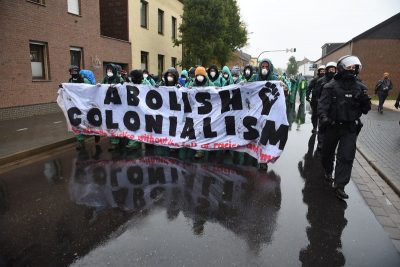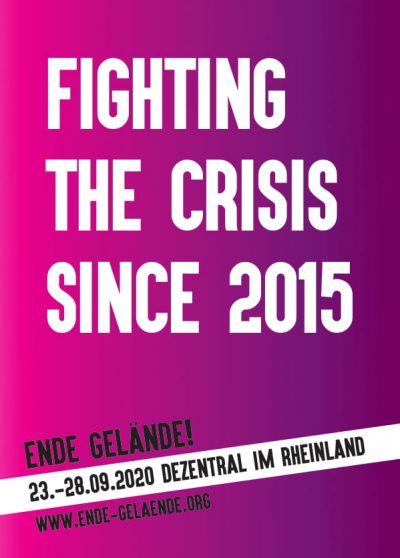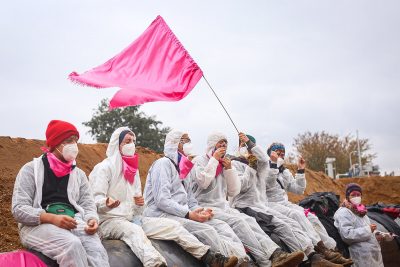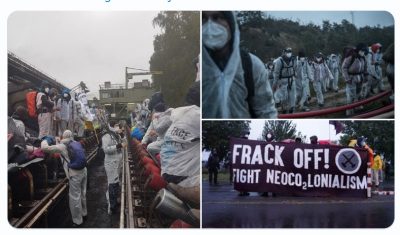Antiracist Infomail #2 – Tokenism
In our Antiracist Infomail #2 we would like to inform you about tokenism at Ende Gelände and in the German Climate Justice movement as a whole and encourage you to inform yourself about the concept.

Dear people fighting for Climate Justice,
In our Antiracist Infomail #2 we would like to inform you about tokenism at Ende Gelände and in the German Climate Justice movement as a whole and encourage you to inform yourself about the concept. In the mail we mainly address
white
(1)
people.
(The Infomail #1 General Recommendations can be found here:
https://www.ende-gelaende.org/en/news/anti-racist-infomail-1/
)
What is tokenism?
The term was coined by the US-American sociologist Rosabeth Moss Kanter developed in the late 1970s. It designates the situation when marginalized people take (unintentionally) an alibi function within groups. Tokens are then not considered as individuals, but only as representatives of “their” supposed group and thus are reduced to their purported identities. This way, they do not have the opportunity to speak for themselves, but are supposed to represent whole (socially constructed) groups. With that, marginalized individuals like BIPoC (Black, Indigenous and People of Color) (2) or FLINT people (women, lesbians, inter, non-binary and trans-) become supposedly visible, however the discriminating structures within the organization remain the same. Through tokenism, groups or institutions present themselves to the outside world as emancipated and diverse, in order to gain recognition. The privileged people within the structure can, however, continue to secure their position of power and privileges. Through tokenism, BIPoC are seen constantly and ONLY as a representative of a group and ONLY as contact partners for antiracism and not perceived as individuals.
Where is there tokenism in the climate movement?
At Ende Gelände and in the rest of the climate movement in Germany, tokenism occurs, for example, when BIPoC are directly asked by white people or people they don’t know if they want to do press work, even though they never said they had interest on it or wanted to speak in public. Another example is when BIPoC are constantly asked to provide antiracism education, even though they have never said they were experts in antiracism training or that they would like to be approached to talk about this topic. You may have noticed that there is something problematic about these situations. As yourself: would you ask a white person you barely know if they would give an interview for your group or to explain the everyone concept of critical whiteness ? Probably not.
How can you avoid tokenism?
1. Tokenism occurs primarily in structures with a strong hegemonic dominance. In the climate movement in Germany, a strong white dominance occurs. So, to avoid tokenism, the first step is to actively work on dismantle the white dominance within the group structure. This requires an active antiracism process in which it is asked why there is a white dominance and how it can be dismantled. White people should first look at their own actions and ask how they contribute to the fact that mainly white people are addressed, instead of portraying the problem as “too few” BIPoC in the group. As long as the structures are not more accessible, it is no surprise that there is little representation of BIPoC. The same applies of course to other forms of discrimination.
2. Tokenism also occurs in structures in which BIPoC are isolated and are therefore not able to exchange their experiences with other BIPoC empower themselves. Support should be given to create room for networking and empowerment of BIPoC within structures. This may include, for example, financing the professional BIPoC empowerment workshops provided by BIPoC experts in the topic. But this also includes safer spaces, such as a BIPoC tent at camps or action trainings specifically for BIPoC.
3. Tokenism arises from a certain way of thinking and setting goals. Before you, as a white person, ask BIPoC for interviews or express their opinion about racism, think about why you are doing this. Is it about the person themself and their skills? Or is it just about representation? Are you asking this person because you think they are probably interested, or because you attribute them things just because the person is not white ? If, after asking yourself these questions, you realize that you could be implying a racist attribution, othering and/or tokenism, better not ask the person at all. There is also the possibility of not addressing persons directly, but rather to address questions to more people. Press enquiries could be sent for example by email lists and then BIPoC can if desired reply directly. With that, people can decide individually whether they are willing to take on these tasks and whether they are qualified for it.
4. Tokenism occurs when the votes, demands and proposals of BIPoC are not heard, but they are used only for external image. Tokenism can thus be prevented by supporting BIPoC already present in the structures. For example, if BIPoC are already involved in press work (or other areas), or say that they have interest on it, it is fundamental to support them in this and try to remove possible obstacles. This is only possible if people listen properly and are willing to rethink “tried and tested” methods, forms of organization, strategies etc. and to improve them with respect to antiracism. Besides: not all people want to be in the spotlight. Just like you may accept that many of your white friends have good and individual reasons for not wanting to be in the public eye, you should act the same with respect to BIPoC activists.
When BIPoC criticize racist structures, white people should not give them unsolicited the full responsibility for supervising antiracism initiatives, but ask them how they feel about it. It may be, for example, that the request is to arrange paid antiracism experts to support the process. If you want to do it seriously, you should make sure that the valuable antiracism work can be properly financed.
Here you can find further information:
Articles:
– Azadê Peşmen: Hä, was ist denn ein Token?
https://missy-magazine.de/blog/2017/12/14/token/
– Poliana Baumgarten: Warum es nicht reicht, dass die Bahn mit People of Color wirbt
https://ze.tt/warum-repraesentation-von-menschen-of-color-auf-plakaten-nicht-genug-ist/
Podcast:
– Parallel Dazu: Tokenism
https://open.spotify.com/episode/5Sgwo6tQCn52aakDcRJiBZ
We hope you can take some food for thought and reflect about tokenism in your groups. The issue concerns us all and not just people who do press work. The next Infomail will be about cultural appropriation. We hope that this will be another small impulse for starting anti-racism reflections!
Solidarity greetings,
your Antira AG from EG Berlin
(1)
white
:
white
, in contrast to terms like Black and People of Color, is not a political, empowering self-description, but describes a dominant position that is usually not named. The name serves to make
white
privileges visible, because they are usually invisible to
white
people. Racism also structurally assigns
white
people a certain social position. This position is associated with privileges, dominance and a standard for judging non-
white
, without itself being marked
white
. To make clear that
whiteness
is not an empowering self-designation, we write it in
white
small and italic letters, in contrast to the empowering self-designation Black, which we write in capital letters and non-italic.
(2) BIPoC: BIPoC stands for Black, Indigenous and People of Color. The term, which originates from the US-American civil rights movement, is a self-description and does not describe the biological characteristics of humans, but a social construction that assigns people a certain social position. What BIPoC have in common are shared experiences of racism, exclusion from the white -dominated majority society, and collective attributions of “otherness”. The concept sees itself as emancipatory and in solidarity. It positions itself against attempts at division through racism and culturalization as well as against discriminatory designations by white majority societies.




